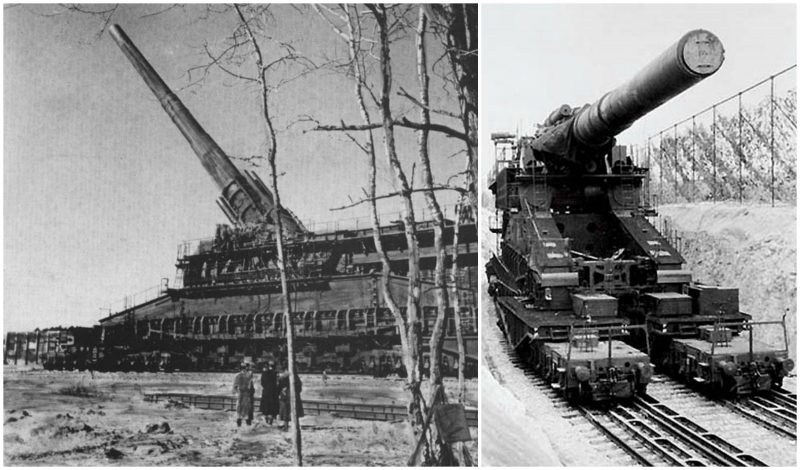In order to conquer the world, the Nazi had to create superior and devastating weapons, ones that the allies could not match. Naturally, those weapons had to be bigger than anything ever seen. Luckily for the allied troops, some of those weapons were only left as mere plans and never saw the light of the day. However, there are few scary weapons the Nazi managed to produce. One of those is the largest and the deadliest gun the world- the Great Gustav.
Originally called Schwerer Gustav (Heavy Gustaf), this was the biggest artillery weapon ever to be used in combat, and it fired the heaviest shells ever known. Great Gustav was built prior to the occupation of France, and its role was to penetrate the fortified walls of French Maginot Line. The Nazi needed a gun that could punch through one meter of reinforced steel wall, or seven meters of reinforced concrete walls, and be beyond the reach of the French artillery at the same time.
The best producers of weapons had to be hired for the construction of this gun. Krupp, the most prominent and most powerful company at the time, was once again assigned the task. Krupp was a 400 years old company, based in Essen. The company played important roles in both the Wolrd Wars, as one of the biggest producers of artillery, shells, ammunition and other steel products. Krupp’s variety of products were enormous, as they even produced U-boats, battleships, howitzers and hundreds of other items.
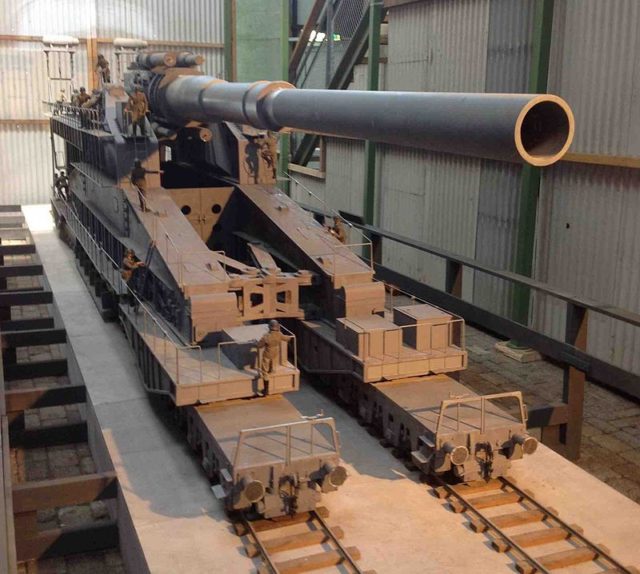
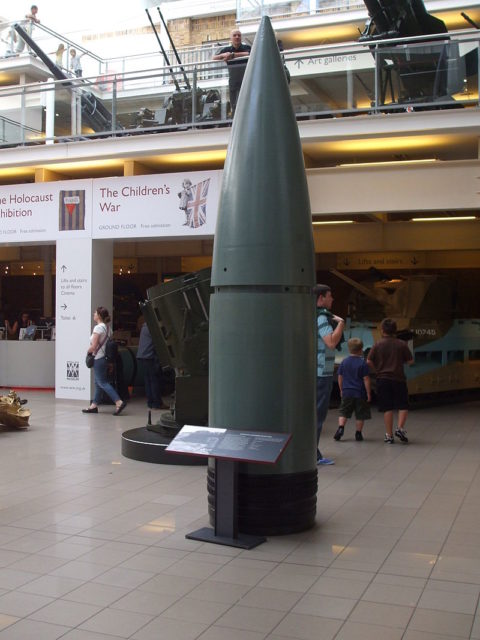
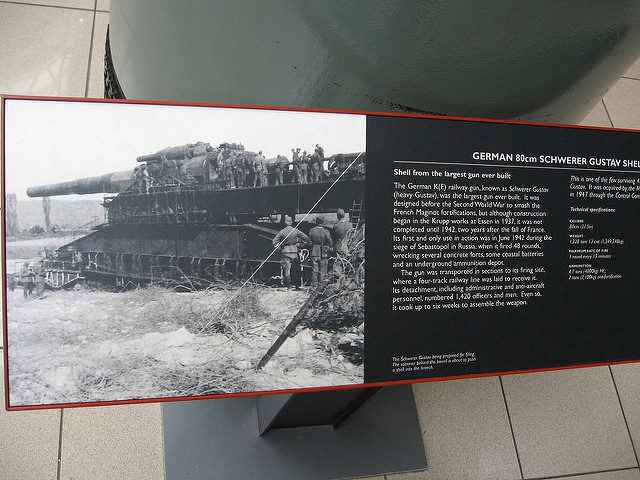
The contract was made in 1934, but nothing happened until 1936. until Hitler himself visited the factory in Essen. He needed the gun finished until 1940, and the plans were given by the company in 1937. After the approval of the design by the Nazi, Krupp began the production in the middle of 1937. However, a tank of that enormous size required more time to be built, so it became clear that the product could not be delivered until 1940.
The engineer Erich Müller was put to the task. His calculations said that the Nazi will need a weapon with a caliber of at least 80 cm and could fire a projectile with the weight of 7 tons, fired from a 30 meters long barrel. The weapon’s weight itself would be over 1000 tons, and it had to be mobile at the same time. Krupp designed the weapon as a railway gun because that was the only way to move it. Great Gustav was supposed to move on a selected curved line of rails, and the first plans of Krupp included weapons with the calibers of 70 cm, 80 cm, 85 cm and 1 meter.
Krupp managed to build a test model in 1939 and send it to the testing grounds in Hillersleben. At the test, the 7-ton shell managed to penetrate both the seven meters concrete wall and the 1-meter steel wall. The tests finished in mid-1940, and Adolph Hitler was invited to the last presentation. Krupp named the weapon Gustav, after Gustav Krupp, a senior director in the company. His son, Alfred Krupp personally presented the weapon to Hitler at the Rügenwalde Proving Ground. In early 1941, the production of the weapon was officially accepted.
The Nazi had ordered two guns. The first gun, Gustav, as per Krupp‘s tradition, was to be delivered for free. The second one, named Dora after the senior engineer’s wife, came at the price of seven million Reichmarks.
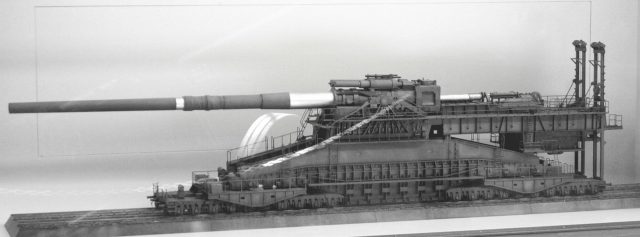
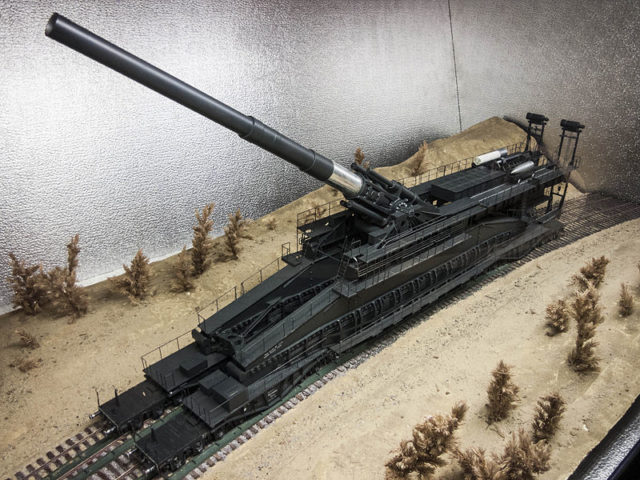
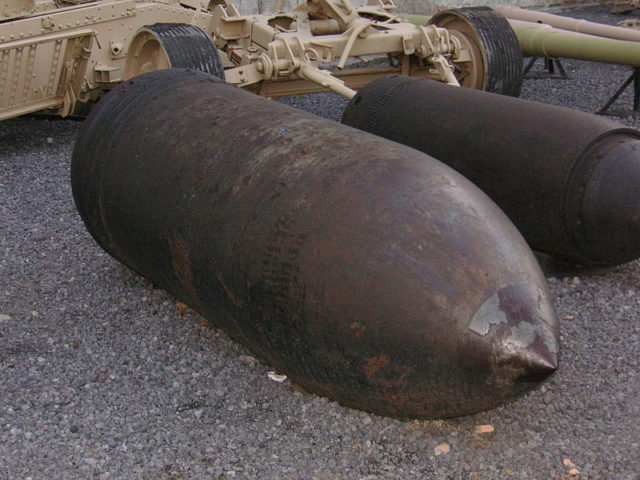
So there it was, the biggest gun the world has ever seen. 47.3 meters long, 7.1 meters wide and 11.6 meters tall, with the weight of 1350 tons, operated by a crew of 250 soldiers. Another 2500 were needed to lay down the tracks for its movement, and two Flak battalions were appointed the task to protect the gun from air attack. Great Gustav could fire the 7 tons rocket to a range of 47 kilometers.
The gun was mounted on a specially designed chassis and moved on two parallel sets of railway tracks, thanks to its 80 wheels. Krupp was also planning to enhance Great Gustav with a super long range missile, that could travel 150 kilometers, but this required the barrel to be extended to unbelievable 84 meters, and the project was never finished.
Great Gustav only saw little action, during the siege of Sevastopol, Russia. It took the Nazi a whole month to install the gun, and they used it to fire around 300 shells. The second use was during the Warsaw uprising when the gun fired around 30 shells.
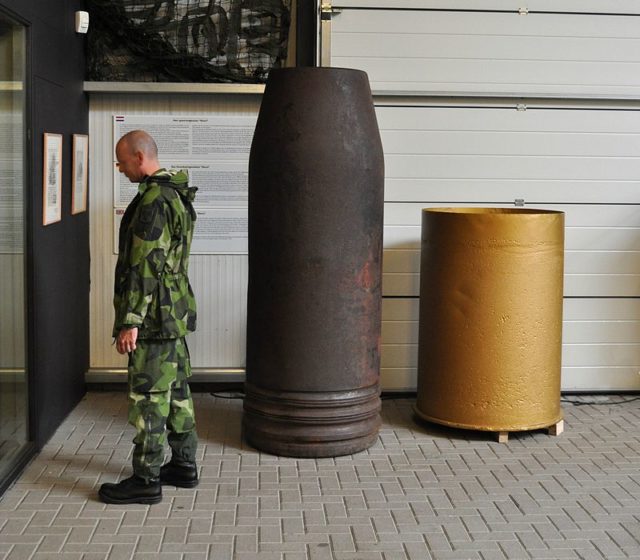
Photo Credit
On 14th April 1945, Great Gustav was destroyed in order to prevent its capture. A week later, remains of the destroyed weapon were found abandoned in a forest close to Auerbach. In the summer of the same year, Gustav was transferred to Merseburg, where the Soviet specialists took German weapons for further studies. Since then, all trails of the greatest gun ever built are lost.
The second gun, Dora, had the same destiny. Captured by the American army, the gun was taken to Grafenwöhr, where it was destroyed on 19th April 1945. Even the debris from the gun was scrapped five years later.
There was also a third gun, found in the Krupp‘s factory in Essen, but only in parts, as it was never finished. Today, the parts of this gun are placed in the Military History Museum of the Bundeswehr in Dresden.
